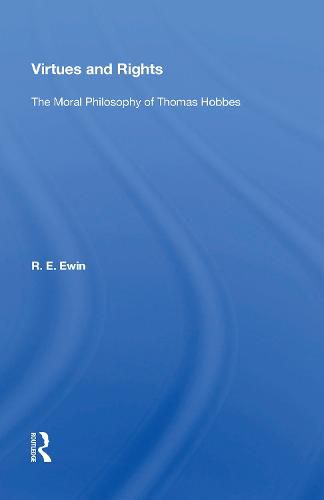Readings Newsletter
Become a Readings Member to make your shopping experience even easier.
Sign in or sign up for free!
You’re not far away from qualifying for FREE standard shipping within Australia
You’ve qualified for FREE standard shipping within Australia
The cart is loading…






This book is a timely interpretation of the moral and political philosophy of Thomas Hobbes. Staying close to Hobbes’s text and working from a careful examination of the actual substance of the account of natural law, R. E. Ewin argues that Hobbes well understood the importance of moral behavior to civilized society. This interpretation stands as a much-needed corrective to readings of Hobbes that emphasize the rationally calculated, self-interested nature of human behavior. It poses a significant challenge to currently fashionable game theoretic reconstructions of Hobbesian logic. It is generally agreed that Hobbes applied what he took to be a geometrical method to political theory. But, as Ewin forcefully argues, modem readers have misconstrued Hobbes’s geometric method, and this has led to a series of misunderstandings of Hobbes’s view of the relationship between politics and morality. Important implications of Ewin’s reading are that Hobbes never thought that the war of each against all was an empirical possibility for citizens; that his political theory actually presupposes moral agency; and that Hobbes’s account of natural law forces us to the conclusion that Hobbes was a virtue theorist. This major contribution to Hobbes studies will be praised and criticized, welcomed and challenged, but it cannot be ignored. All philosophers, political theorists, and historians of ideas dealing with Hobbes will need to take account of it.
$9.00 standard shipping within Australia
FREE standard shipping within Australia for orders over $100.00
Express & International shipping calculated at checkout
This book is a timely interpretation of the moral and political philosophy of Thomas Hobbes. Staying close to Hobbes’s text and working from a careful examination of the actual substance of the account of natural law, R. E. Ewin argues that Hobbes well understood the importance of moral behavior to civilized society. This interpretation stands as a much-needed corrective to readings of Hobbes that emphasize the rationally calculated, self-interested nature of human behavior. It poses a significant challenge to currently fashionable game theoretic reconstructions of Hobbesian logic. It is generally agreed that Hobbes applied what he took to be a geometrical method to political theory. But, as Ewin forcefully argues, modem readers have misconstrued Hobbes’s geometric method, and this has led to a series of misunderstandings of Hobbes’s view of the relationship between politics and morality. Important implications of Ewin’s reading are that Hobbes never thought that the war of each against all was an empirical possibility for citizens; that his political theory actually presupposes moral agency; and that Hobbes’s account of natural law forces us to the conclusion that Hobbes was a virtue theorist. This major contribution to Hobbes studies will be praised and criticized, welcomed and challenged, but it cannot be ignored. All philosophers, political theorists, and historians of ideas dealing with Hobbes will need to take account of it.